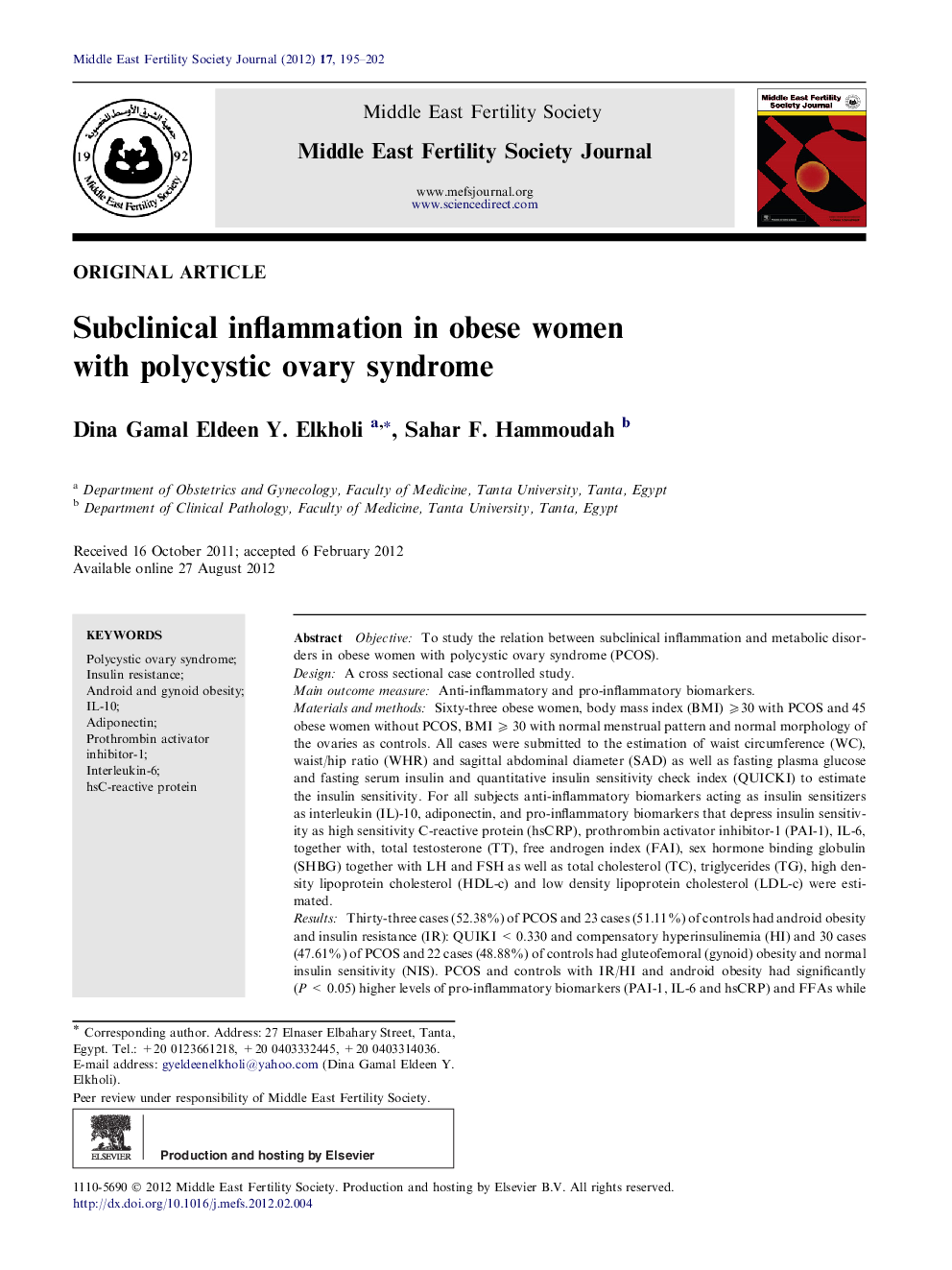| Article ID | Journal | Published Year | Pages | File Type |
|---|---|---|---|---|
| 3966377 | Middle East Fertility Society Journal | 2012 | 8 Pages |
ObjectiveTo study the relation between subclinical inflammation and metabolic disorders in obese women with polycystic ovary syndrome (PCOS).DesignA cross sectional case controlled study.Main outcome measureAnti-inflammatory and pro-inflammatory biomarkers.Materials and methodsSixty-three obese women, body mass index (BMI) ⩾30 with PCOS and 45 obese women without PCOS, BMI ⩾ 30 with normal menstrual pattern and normal morphology of the ovaries as controls. All cases were submitted to the estimation of waist circumference (WC), waist/hip ratio (WHR) and sagittal abdominal diameter (SAD) as well as fasting plasma glucose and fasting serum insulin and quantitative insulin sensitivity check index (QUICKI) to estimate the insulin sensitivity. For all subjects anti-inflammatory biomarkers acting as insulin sensitizers as interleukin (IL)-10, adiponectin, and pro-inflammatory biomarkers that depress insulin sensitivity as high sensitivity C-reactive protein (hsCRP), prothrombin activator inhibitor-1 (PAI-1), IL-6, together with, total testosterone (TT), free androgen index (FAI), sex hormone binding globulin (SHBG) together with LH and FSH as well as total cholesterol (TC), triglycerides (TG), high density lipoprotein cholesterol (HDL-c) and low density lipoprotein cholesterol (LDL-c) were estimated.ResultsThirty-three cases (52.38%) of PCOS and 23 cases (51.11%) of controls had android obesity and insulin resistance (IR): QUIKI < 0.330 and compensatory hyperinsulinemia (HI) and 30 cases (47.61%) of PCOS and 22 cases (48.88%) of controls had gluteofemoral (gynoid) obesity and normal insulin sensitivity (NIS). PCOS and controls with IR/HI and android obesity had significantly (P < 0.05) higher levels of pro-inflammatory biomarkers (PAI-1, IL-6 and hsCRP) and FFAs while anti-inflammatory biomarkers (IL-10 and adiponectin) were significantly (P < 0.05) lower than PCOS and controls with NIS and gynoid obesity. TT, FAI and LH were significantly (P < 0.05) higher in the two groups of PCOS than the two groups of controls. But TT and FAI were significantly (P < 0.05) higher in PCOS + IR/HI and android obesity than PCOS + NIS and gynoid obesity.ConclusionPCOS and controls with andriod obesity had higher levels of pro-inflammatory biomarkers and lower levels of anti-inflammatory biomarkers than PCOS and controls with gynoid obesity. The former groups had IR/HI and metabolic disorders of carbohydrate and lipid metabolism while the latter groups had NIS and normal metabolism. It seems that these metabolic disorders are induced by android obesity with subclinical inflammation of the expanded visceral adipose tissue rather than PCOS per se. The PCOS per se is not associated with subclinical inflammation.
